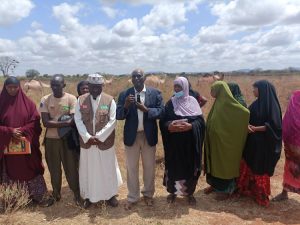[gravityform id=”1″ title=”false” description=”false” ajax=”true”]
Mashariki Television Networks Limited Email: info@themasharikinewspaper.com
Email Us
Our address
Mashariki Communications Centre
Meru-Maua Road
Main Telephone: +254 797 372 837
Postal Address: P. O. Box 747-60200, Meru, KenyaWe are social

Officials from Community Initiative Facilitation and Assistance (CIFA) and members of the community during the handover of camels to four groups | PHOTO-Courtesy
By Eastern Correspondent
A Community Initiative Facilitation and Assistance (CIFA) organization recently rolled out a program seeking to upscale camel management and production technologies by giving hybrid camel bulls to five groups in the Moyale sub-county.
The program is expected to boost camel production in the county and mitigate the effects of climate change. Yaballo Moyale handed over the camels to four groups.
While presiding over the distribution of camels, CIFA CEO Salad Liban Arero emphasized the benefits of camels raring, saying that camels provide a direct livelihood to thousands of pastoralists in the region.
“Camel production is very sustainable owing to its adaptability to harsh environments,” said Salad
He said camel is a more reliable milk producer than other classes of livestock, especially during the dry season.
Salad said the organization has embarked on a camel exchange program in order to upgrade various breeds and boost camel milk and meat production.
He revealed that in a bid to, his organization promotes appropriate technologies to add more value to camel milk which he said will subsequently lead to increased income for farmers.
CIFA’s board treasury Hajj Ibrahim Oshe said the gist of the program is to have the Somali camel breed multiplied so as to have parent stock distributed later to the farming communities.
“We are working towards improving productivity as the environment changes in order to ensure increased wealth creation,” Said Hajj Oshe
He said as the camel raring continues to grow and expand, more breeds are needed to improve performance and productivity.
Salad warned beneficiaries of camel distribution against selling it and urged them to ensure non-members also benefitted from the breeds.
He asked them to take care of the camel just like their own and challenged women who now rare camels to make use of camel milk to positively change their lives.
Camel’s expert and head of the camel program in CIFA Hussein Walaqa said camel milk contains natural therapeutic and immunity-boosting properties due to the higher concentration of lactoferrin and helps in fighting various diseases including cancer, diabetes, hypertension, and skin diseases.
He, however, said lack of awareness about camel milk’s benefits and lack of infrastructure especially milk coolers in remote areas are the limitation that needs to be addressed for this dairy segment to flourish.
According to Hussein, there are many factors constraining the development of camel production which include low productivity, poor breeds, inadequate physical and institutional support infrastructure, and poor market development.
He said the constraints on the camel milk value chain cause low production and minimize benefits to herders.
Poor hygiene and handling increase losses due to spoilage and health risks to consumers.
Hussein said several interventions that will spur production activity with camel milk were adopted by the CIFA.
The intervention, he said, contributes to enhancing livelihood and promoting decent work with the camel value chain.
He said camels have enormous potential to enhance the livelihoods and build the resilience of the pastoralist communities.
“Camels have played a pivotal buffering against intermittent drought periods,” he said
Speaking on behalf of the beneficiaries, Watiti United women’s group chair lady Fatuma Hassan thanked the organization for the distribution of hybrid camel bulls, saying camel would positively change members’ lives.
“Camels are actually helping us combat food shortages. We are now financially empowered since we can sell camel’s surplus. The Camel milk is highly priced compared to cow milk,” she said
She said a liter of camel milk goes to Sh100 and due to climatic conditions, camels are the only animals that can save locals from starvation.
“Each year during the dry season, crops wither and many animals die. People migrate to the highlands in search of food. Camels cushion us from all this,” said Fatuma.
She explained that besides supplementing food and income to the families, the camels have also helped them in environmental conservation.
“Unlike other livestock, camel’s feet have a flat sole which doesn’t loosen the topsoil making it vulnerable to erosion,” she said
Fatuma said when they started Watiti United Women’s Group; they couldn’t believe that they would get the camels.
Marsabit camel’s herder Issack Adan pointed out that Somali camel produces more milk than other types.
“Somali camel produces three liters of milk during drought or four liters when pastures are plenty,” he said
He added that the Somali camel adapts easily to hot climates and therefore has an edge over others.
“The Somali breed of camels have been known to grow faster, attain a bigger body weight and higher producer of milk,” he explained

Comments (0)